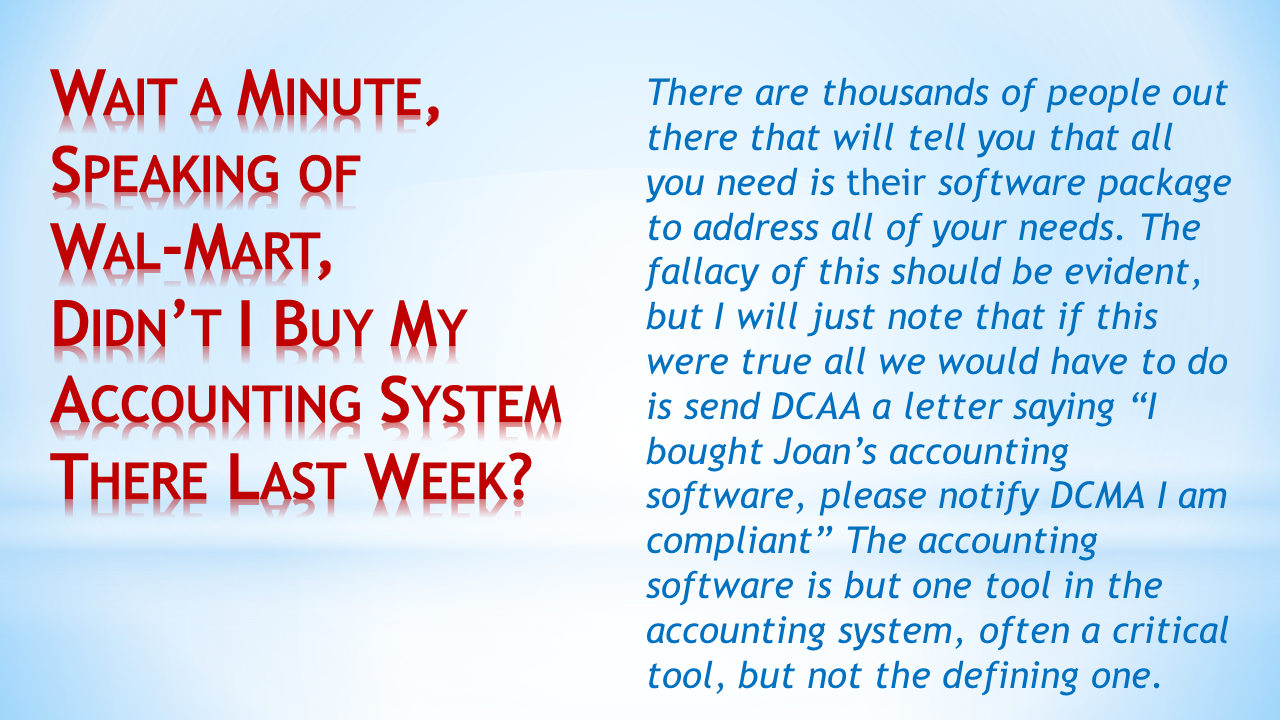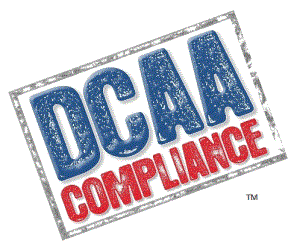The COST Accounting System
There are three simple reasons why you should care about the quality of your accounting system:
- An Excellent Cost Accounting System Makes You Money
- The Government Requires A Comprehensive Compliant Accounting System
- It Is A Challenge, But Not One You Can Ignore
Wake Up and Smell the Profits
Can you imagine Wal-Mart selling you a television without knowing what they paid for it? Yet, I would argue that contractors do this all the time. Contractors sell the government their work product (services and materials) without a clear understanding of what it costs them. Many contractors see their companies as profitable without the benefits derived from knowing the profitability of their individual contracts or products.
Not only does Wal-Mart keep track of what they paid for the television: Wal-Mart keeps track of how much it cost to ship it to the store, how much it costs to run the store (lights, heating, depreciation, cleaning, and so forth), and how much they pay the guy to help you load it in your car. They will also track how much they spend from their home office and anything else they can reasonable track as a cost, to include their costs if you bring the television back.
I would argue that Wal-Mart changed the retail world (just ask Sears) for better or worse; because they understood, controlled their costs, and took advantage of efficiencies they could create.
Many contractors do an excellent job running their business utilizing common sense, but you would be amazed how much more success they enjoy when provided critical cost and accounting information. Time and time again we discover that one or two projects are highly profitable while the other six or seven projects are break even at best. Often this imple realization can dramatically increase profits.

Contractors can apply this same analysis to locations, people, and other aspects of business to provide insights into efficiency and profitability.
Sometimes contractors respond to my suggestions by arguing that the ‘marketplace’ dictates what they can charge and everything else (cost) is not that critical.
I nod my head slowly, agreeing with their wisdom. I take a moment and then ask if their competitors (who understand their own costs) are making three or four times more profit, and I wonder how they are using those additional profits to compete with them.
The Government Demands a Comprehensive Compliant Accounting System
“Contractor business systems and internal controls are the first line of defense against waste, fraud, and abuse. Weak control systems increase the risk of unallowable and unreasonable costs on Government contracts“
Federal Register / Vol. 77, No. 37 / Friday, February 24, 2012 / Rules and Regulations
The Department of Defense published an extensive list of their expectations relevant to a contractor’s accounting system at DFARS 252.242-7006.The list covers eighteen (18) major areas to include:
- A sound internal control environment, accounting framework, and organizational structure;
- Proper segregation of direct costs from indirect costs;
- Identification and accumulation of direct costs by contract;
- A logical and consistent method for the accumulation and allocation of indirect costs to intermediate and final cost objectives;
- Accumulation of costs under general ledger control;
- Reconciliation of subsidiary cost ledgers and cost objectives to general ledger;
- Approval and documentation of adjusting entries;
- Management reviews or internal audits of the system to ensure compliance with the Contractor’s established policies, procedures, and accounting practices;
- A timekeeping system that identifies employees’ labor by intermediate or final cost objectives;
- A labor distribution system that charges direct and indirect labor to the appropriate cost objectives;
- Interim (at least monthly) determination of costs charged to a contract through routine posting of books of account;
- Exclusion from costs charged to Government contracts of amounts which are not allowable in terms of Federal Acquisition Regulation (FAR) part 31, Contract Cost Principles and Procedures, and other contract provisions;
- Identification of costs by contract line item and by units (as if each unit or line item were a separate contract), if required by the contract;
- Segregation of preproduction costs from production costs, as applicable;
- Cost accounting information, as required—
- By contract clauses concerning limitation of cost (FAR 52.232-20), limitation of funds (FAR 52.232-22), or allowable cost and payment (FAR 52.216-7); and
- To readily calculate indirect cost rates from the books of accounts;
- Billings that can be reconciled to the cost accounts for both current and cumulative amounts claimed and comply with contract terms;
- Adequate, reliable data for use in pricing follow-on acquisitions; and
- Accounting practices in accordance with standards promulgated by the Cost Accounting Standards Board, if applicable, otherwise, Generally Accepted Accounting Principles.
The Challenge
The Risk
The government continues to shift the consequences for an ‘inadequate’ accounting system to the contractors.
First, Despite regulations forbidding the government from issuing cost type contracts to contractors without an approved accounting system (FAR (16.301-3(a)(3))), the government continues to do so and blames the contractor for taking the contract.
Second, DCAA recently took the strange position that WHEN the government comes in and “claims” there are problems with the contractor’s accounting system the costs to fix those “problems” are the contractor and the contractor’s alone. Any costs to work on the accounting system afterwards are “Unallowable” and cannot be charged to the government directly or indirectly.
DCAA’s position is not based on any specific regulation or court case, but their “feeling” that such costs are “unreasonable”. Apparently, DCAA believes only the government is allowed to make mistakes, not contractors– mistakes that may not even be real.
It is important to remember that, according to DCAA’s own records, (page 6) they lose about half of their fights with contractors. Add to this the unfortunate fact that too many contractors decide not to even argue or question DCAA about proposed findings.
It is likely that DCAA will eventually drop this position but they never seem to drop the attitude behind it.
The Solution
Implementing a comprehensive compliant accounting system is a challenge, but a challenge met by small business contractors every day.
The defining aspect of an Accounting System is addressed by a cost accounting and compliant culture expressed by living Policies and Procedures. These Policies and Procedures provide the tools and information necessary to understand, control, and benefit from your financial activity. These Polices and Procedures enforce the habits of control.
Start by educating yourself. This website is a good start and Steve’s book Surviving a DCAA Audit: The Accounting System is an excellent resource to get a handle on these critical issues. Spend time with DCAA’s materials also, put remember that very very few of them have ever stood in your shoes as a small business manager; and like the IRS, DCAA is not interested in your success. It is not their job.
When you are ready to develop your policies and procedures, Steve’s book on this subject is an excellent resource that addresses all of the government’s and DCAA’s defined concerns.
If this seems a bit overwhelming, drop us a line. We are happy to spend a few moments with you on the subject.
We offer contractors a program for helping implement a comprehensive and compliant accounting system with three levels of our involvement based on just how much of the work you have the desire, time, or budget for. The program works with any general ledger software and at any level.
